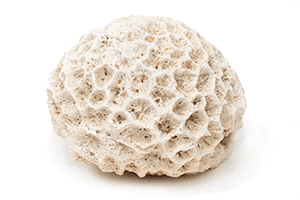As much as 90 percent of the U.S. population may be Chromium deficient (Bergner). Chromium is not a trace mineral, but is an essential mineral. It is an integral part of many enzymes and hormones and works well as a cofactor with insulin to move glucose from the blood into the cells. (Lepore) It is important in carbohydrate metabolism and a blood-sugar balancer almost without equal. (Thomas) Chromium plays an important role in glucose metabolism through the Glucose Tolerance Factor (GTF), which is a complex of trivalent chromium, niacin and three amino acids that are found in glutathione. Samples of stony corals tested at the level of 0.625 ppm. (Halstead)
GTF chromium in the blood plasma may provide an anti-arteriosclerosis effect by retarding cholesterol/calcium formation in cardiovascular vessels. (CRG) Thus a chromium deficiency may result in an increase in atherosclerosis, heart disease, diabetes as well as impaired protein metabolism. Chromium plays an important role in the metabolism of both fats and carbohydrates and appears to be related to the structural integrity of DNA and RNA, the body’s genetic material. (Bergner) Outstanding sources of chromium are found in whole grains (especially whole wheat), apples, corn, cucumbers, onions, prunes, mushrooms and dry beans. (Thomas)
Bruce Halstead, Fossil Stony Coral Minerals, pages 68-69.
Donald Lepore, The Ultimate Healing System, page 58.
Paul Bergner, The Healing Power of Minerals, pages 106-7, ff.
Lalitha Thomas, 10 Essential Foods, pages 96-97, ff.
CRG, Clinical Reference Guide, International Foundation for Nutrition and Health, page 16.
